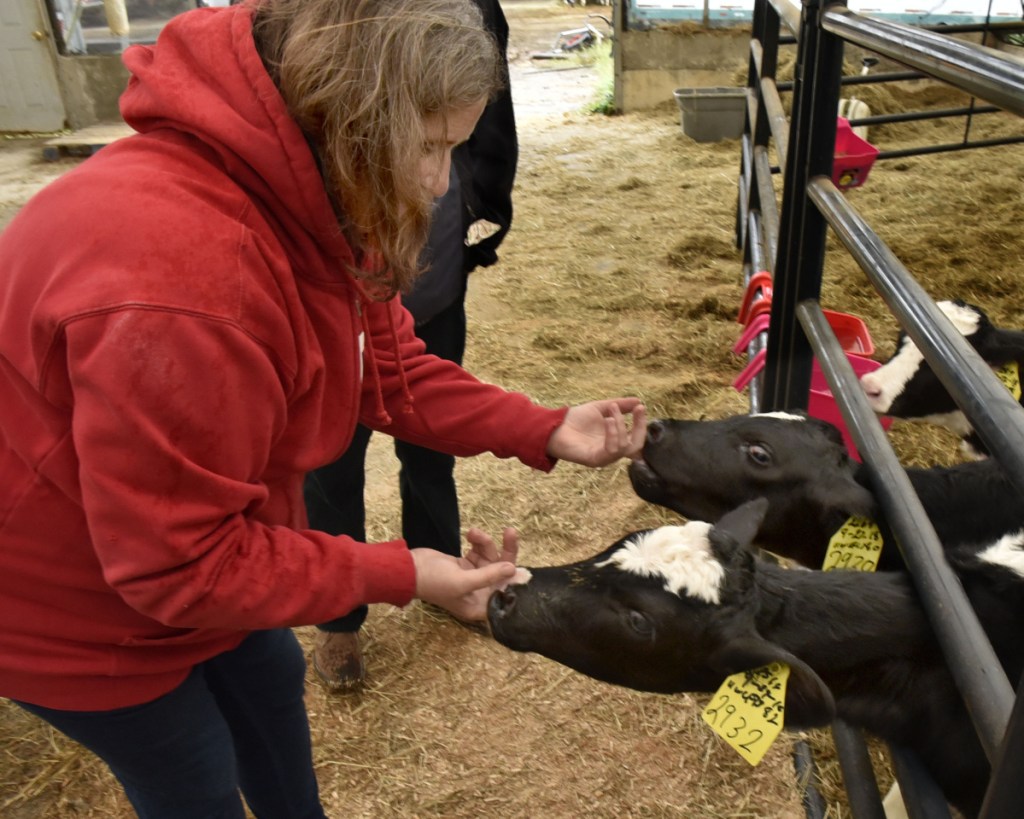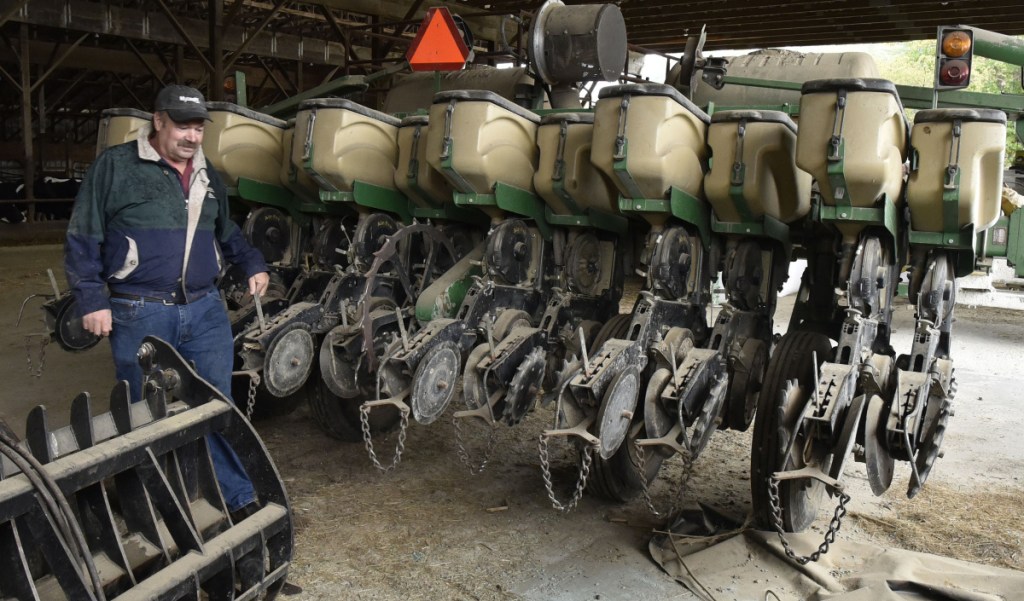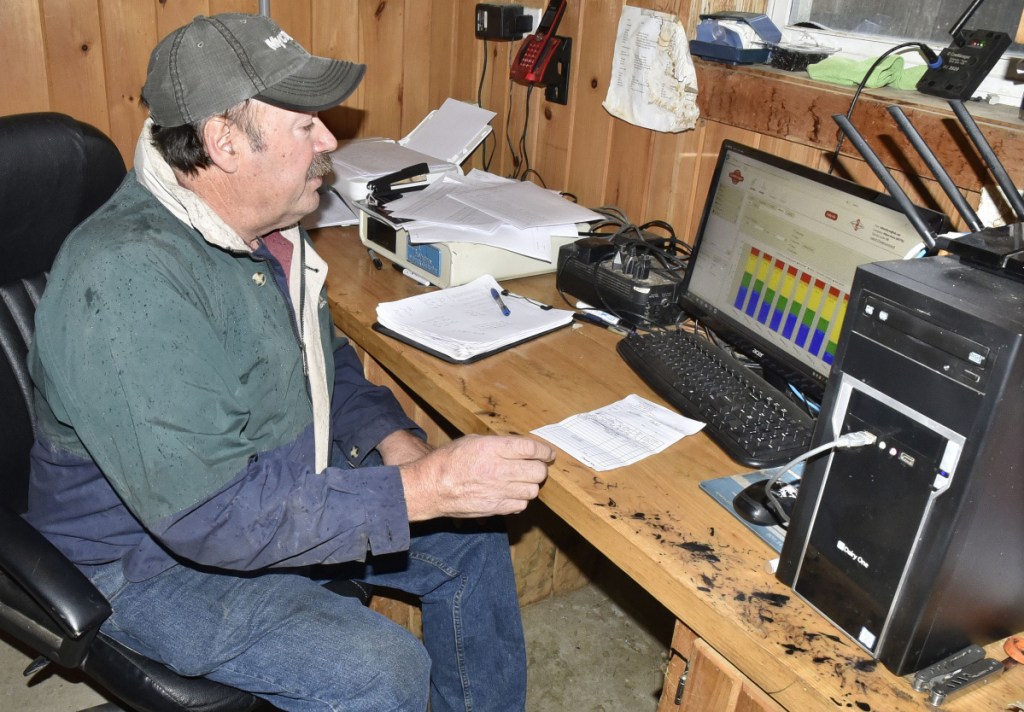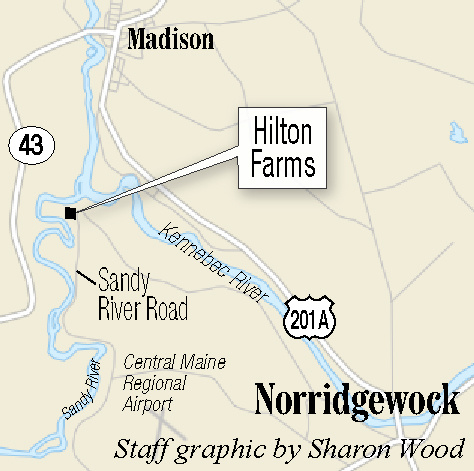NORRIDGEWOCK — As Hilton Farms embraces new technology, its owners have been recognized with an award given each year to one Maine dairy farm.
Jim and Liz Hilton say they are honored that their Norridgewock farm is this year’s Green Pastures Award winner. The annual award is given to one dairy farm from each New England State at the Big E — the Eastern States Exhibition — which is billed as the largest fair in the Northeast and took place in September.
“I’d say it’s an honor to get it,” Liz Hilton said in an interview at the farm this week.
“We’re very honored to get the award,” said Jim Hilton, noting that the couple were up against several other good candidates from Maine. He speculated that the farm won the award partly because of its use of technology to monitor its cows.
“Really, it’s a recognition saying this is a farm that has gone and put in the effort to do things right,” said Julie-Marie Bickford, the executive director of the Maine Dairy Industry Association, about the Green Pastures Award.
Jim Hilton’s parents, Frank and Shirley, who both died in the past year, were running the farm in 1969 when it first received the Green Pastures Award.
“I’d like it if my dad was still alive to see it, because it was really a big thing when my mom and dad got it,” Hilton said, noting that there were thousands of dairy farms in Maine at the time, compared to hundreds now.
“Agriculture has changed a lot in the last 65 years,” Hilton said. His father and grandfather started with roughly 40 dairy cows in 1954, and the Hilton Farms herd has grown to over 200 today.
Hilton attributed his farm’s Green Pastures victory this year in part to efforts aimed at increasing efficiency and embracing new technology.
“The thing I guess that the committee liked, or stuck out to them, was the amount of technology that is being used at the farm,” Hilton said.
The Hiltons have turned to several different forms of software that allow them to keep track of their cows’ feed, milk production and health more easily. The newest technology on the farm, a Dutch software product called Cow Manager, uses sensors pinned on each dairy cow’s ear to help identify health problems and illness. The sensor constantly is assessing each animal’s head movements, which can indicate whether a cow is healthy.
Hilton can access the herd data on his computer and his phone, receiving alerts in the program when a cow is potentially sick or is ready to breed.
“I could be in New York and monitor my herd,” Hilton said with a chuckle.
The system allows the farmers to take a more proactive approach to their animals’ health and deal with problems before they get worse.
“When a cow gets off her feet, that’s a big problem to handle,” Hilton said.
The internet-dependent software is possible on the farm only because the Hiltons are able to connect to a Hussey Communications tower located in New Sharon.
“They’re being monitored 24 hours a day with this system, and it’s saved us a lot of time,” Hilton said, also pointing to other newer measures on the farm, including energy-efficient LED lights, a variable-speed vacuum pump in the milking system, and a plate cooler that cools the milk before it reaches the farm’s bulk tank.
“We’ve been kind of building as we go,” Hilton said about the farm’s increasing use of technology.
Bickford said farmers’ embrace of this type of technology “is becoming more and more common” and that “it’s a big deal to incorporate some of that on the farm.”
“Hilton Farms, they’ve done a couple of things really well,” Bickford said, citing the Hiltons’ work in diversifying with other crops, such as grain, and their ability to transition between generations.
At age 61, Jim Hilton conceded that he is “not a spring chicken anymore” and hopes one of his children eventually will take over the operation. One of his sons works full time on the farm, which Hilton said has five employees.
After decades in the industry, Hilton sees challenges for new dairy farmers in particular, calling the current business atmosphere “kind of an economic struggle or a balancing act right now.”
He said a neighboring farmer has been having trouble finding someone to buy his business.
“Twenty years ago, there would have been people lined up at his door,” Hilton said.
He hopes that the recently announced trade agreement among the U.S., Canada and Mexico can give a boost to dairy farmers by opening more export opportunities.
“Milk has been going to waste, just because it doesn’t have a home,” Hilton said.
While Bickford still was sifting through the agreement details as of Tuesday, she said that expanding the potential for U.S. dairy exports into Canada is “exactly what we’re hoping” for in the deal.
She speculated that the agreement “might give a boost on the price” of domestic milk and provide more certainty to U.S. dairy farmers.
Regardless of what happens with international trade discussions or the price of milk, Hilton seems confident about at least one thing: He’ll probably be returning to the Big E next year.
He had never been to the event until this fall, when the family accepted the Green Pastures Award.
“But I think I’m going to go back,” he said with a smile.
Matt Junker — 861-9253
Twitter: @mattjunker
Send questions/comments to the editors.








Comments are no longer available on this story